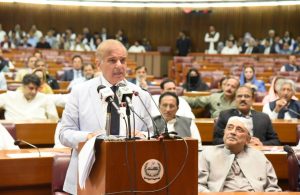On his first day as Pakistan’s prime minister, Shehbaz Sharif arrived at the office two hours before the official start of the day. In his first acts of business, he changed office operating hours from 10:00 am to 8:00 am, and canceled the two weekly off-days.
“No moment will be wasted,” said the new prime minister, who is known for holding 6:00 am meetings during his long stint as the chief minister of Pakistan’s Punjab province. Exactly a week after taking his oath as prime minister, Sharif arrived at a metro station in Islamabad at 7:00 am for an inspection.
In his first week, Sharif met with Chinese ambassador Nong Rong, spoke to Saudi crown prince Mohammad bin Salman, wrote a letter on Kashmir to Indian Prime Minister Narendra Modi, and told the United States that “Pakistan wishes constructive engagement.” He also summoned economic experts to discuss Pakistan’s fiscal turmoil and took a trip to Karachi, the country’s financial hub.
Shehbaz Sharif may not possess the political vigor of his brother Nawaz, nor the magnetic charisma of his opponent and former Prime Minister Imran Khan, but he is a man of tact, determination, and competence.
His reputation as a tireless administrator translated into much-needed economic relief with the Pakistani rupee regaining 5 percent against the U.S. dollar and the Pakistan Stock Exchange rising by 1,700 points.
It wasn’t all glory though. Sharif also announced an increase in pensions two months ahead of the new budget and rejected a proposal to increase petroleum prices – a decision that is costing the national exchequer a monthly loss of over 40 billion Pakistani rupees (approximately $21.4 billion). His financial advisor said the move “will have to be revisited.”
As prime minister, Sharif’s foremost task is to tame inflation and stabilize the economy. Pakistan’s foreign reserves are depleting, there is no respite for the falling rupee, public debt has soared, and the trade deficit is at a record high. To top it off, the country is set to witness yet another energy crisis this summer.
Yet his topmost challenge will be to sustain his administration. Unlike his predecessor, Sharif is a parliamentary prime minister without a public mandate. His party, the Pakistan Muslim League-Nawaz, has a total of 84 seats in the National Assembly while Khan’s Pakistan Tehreek-e-Insaf gained 155 seats in the 2018 general polls. To stay in office, it is imperative for Sharif to maintain the coalition. The composition of disparate parties in his cabinet reflects his dependence on allies.
This alliance of old faces also represents the return of the old order.
For the second time in Pakistan’s history, men from one family occupy two of the most powerful posts in the country: prime minister and the chief minister of Punjab, Pakistan’s largest province. Interestingly, Shehbaz Sharif’s name comes up in both setups. He was Punjab chief minister when his brother Nawaz was prime minister back in the 1990s. Now, when he is the prime minister, his son, Hamza, has taken the reigns of Punjab.
Dynasty politics, however, is not limited to the Sharif family. The country’s veteran political party, the Pakistan People’s Party, is also helmed by a father-son duo: former president Asif Ali Zardari and his son Bilawal Bhutto Zardari. Struggling to defend dynastic politics on CNN, Bilawal Bhutto Zardari told host Becky Anderson that he was forced into Pakistani politics. “I didn’t choose it,” he insisted. Bilawal inherited his maternal grandfather’s party after the assassination of his mother in 2007. He was 18 at the time.
This is not to say that Pakistan’s political landscape lacks talent. Many politicians have been associated with these parties for decades and have held numerous ministries and government positions. The power, however, always lies within the family. Such concentration of power within political dynasties is a travesty of the democratic process and defies its very essence.
It isn’t a surprise then that Khan’s political campaign against the Sharifs and the Bhutto-Zardaris has garnered much traction amongst the population. His narrative that a “foreign conspiracy” culminated in his ousting while the military establishment remained “neutral” has also gained momentum across the country – and on social media.
Khan’s rhetoric lambasting foreign interference while lamenting the lack of internal interference is not just ironic but polarizing.
The rising anti-American and anti-army sentiments mean that Sharif has many fires to put out while juggling an ailing economy and running a cabinet with a varied share of interests – and he is already running out of time.
Even if allowed to complete its term, the incumbent government barely has a year-and-a-half left before general elections. It wouldn’t be wrong to imagine Sharif as the pre-interim interim prime minister tasked to right seven decades worth of policies so the public can elect a new leader to replace him.

































